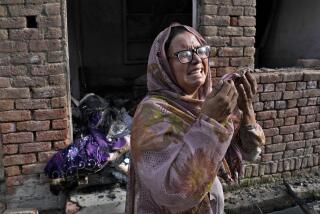Pakistan’s only Christian Cabinet member assassinated
- Share via
Reporting from Islamabad, Pakistan — Gunmen killed the only Christian member of Pakistan’s Cabinet on Wednesday in Islamabad, the second assassination this year of a top official who had opposed the country’s controversial blasphemy law and championed the rights of its beleaguered minorities.
The slaying of Minority Affairs Minister Shahbaz Bhatti, 42, underscored the reach of extremism in Pakistan, a Muslim country founded on the principles of minority inclusion but increasingly unable to counter the influence of hard-line Islamist parties and clerics.
Bhatti, a Roman Catholic, was an outspoken critic of Pakistan’s blasphemy law, which makes it a crime to utter any derogatory remarks or insult in any way the prophet Muhammad, the Koran or Islam.
Critics of the law say it can be exploited to settle scores against adversaries or persecute minorities. A Christian woman, Asia Bibi, 45, faces execution for allegedly violating the blasphemy law.
Bhatti had spoken out against the sentence handed to Asia Bib, as had another top Pakistani liberal, Punjab Gov. Salman Taseer. On Jan. 4, Taseer, 65, was assassinated in Islamabad by a 26-year-old police commando assigned to guard him. The officer, Mumtaz Hussain Qadri, has said he killed the governor because of his opposition to the blasphemy law.
When Qadri appeared in court, lawyers kissed him on the cheek and showered him with flower petals, a reaction that caused many liberals here to worry that support for extremism had begun to seep into the mainstream.
Ali Dayan Hasan, South Asia researcher for Human Rights Watch, called Bhatti’s assassination “a grave setback for the struggle for tolerance, pluralism and respect for human rights in Pakistan.”
“An urgent and meaningful policy shift on the appeasement of extremists that is supported by the military, the judiciary and the political class needs to replace the political cowardice and institutional myopia that encourages such continued appeasement despite its unrelenting bloody consequences,” Hasan said.”
Prime Minister Yousuf Raza Gilani called Bhatti’s death a profound loss “at a time when the whole nation was trying to build bridges between the believers of different faiths and sects.”
Christians, who make up less than 5% of Pakistan’s population of 180 million, occupy the lower rungs of society and are largely relegated to menial jobs. They are not the only oppressed group; Shiite Muslims and other minority Muslim sects are frequent targets of suicide bombings, kidnappings and homicides.
Bhatti was in his black Toyota Corolla with his driver, on his way from his mother’s house to work, when the mid-morning attack occurred.
Witnesses and police said three or four gunmen in a white Suzuki stopped Bhatti’s vehicle, getting out and spraying it with gunfire. One witness, shopkeeper Mohammed Fayaz, said more than 50 shots were fired.
The gunmen scattered pamphlets on the wet pavement that stated Bhatti was assassinated because he opposed the blasphemy law. The pamphlets said the Pakistani Taliban and Al Qaeda were responsible for the attack.
The driver, unhurt, rushed Bhatti to nearby Shifa Hospital, but the minister died on the way, authorities and witnesses said. Authorities say Bhatti had 20 gunshot wounds.
The Toyota had bullet holes on all sides. The backseat was covered with blood.
Bhatti received death threats after Taseer’s assassination and repeatedly asked the federak government for a bulletproof car, to no avail, said Robinson Asghar, a close friend and a fellow Christian.
Wajid Durrani, inspector general for Islamabad police, said the federal government had assigned bodyguards to protect Bhatti. On Wednesday morning, however, Bhatti chose to not have the guards with him, Durrani said. It is not known why.
In a chilling, undated video aired Wednesday by Pakistani television, a calm and defiant Bhatti said he would keep fighting for the rights of Christians and other minorities, even if it meant dying for the cause.
“When I’m leading this campaign for the abolishment of blasphemy law, and speaking for the oppressed, and the marginalized, persecuted Christians and other minorities, these Taliban threaten me,” Bhatti said. “These threats and these warnings cannot change my opinion and principles. I prefer to die for my principles and for the justice for my community rather than to compromise.”
More to Read
Sign up for Essential California
The most important California stories and recommendations in your inbox every morning.
You may occasionally receive promotional content from the Los Angeles Times.













